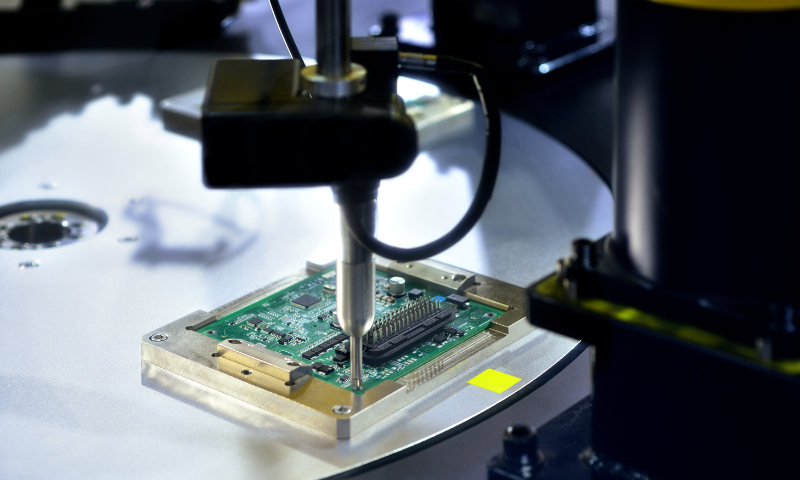
Production of semiconductor chip File photo: VCG
China will ramp up efforts to stand on its own feet in science and technology and solve the issue of foreign stranglehold in the sphere, as part of a push for the country to become a global forerunner in key technological areas, according to key takeaways from the top leadership on Tuesday.
Xi Jinping, general secretary of the Communist Party of China (CPC) Central Committee, has stressed the efforts to accelerate the establishment of a new pattern of development and enhance the security and initiative of development when attending the second group study session of the Political Bureau of the 20th CPC Central Committee on Tuesday afternoon.
As the country eyes expediting the establishment of a new pattern of development, technological self-sufficiency and competitive yet secure supply chains will become all the more important, industry observers said, citing the US-led technology decoupling from China.
In addition to continued policy support, entrepreneurship is envisioned to play a more notable part in ensuring that homegrown innovations are in the driving seat, they noted.
Heightened focus
Accelerating the establishment of a new pattern of development is a strategic decision to realize the Second Centenary Goal and ensure both development and security, as well as a strategic plan to seize the initiative of future development, Xi said.
Only by accelerating the establishment of a new pattern of development can China consolidate the foundation for its economy and enhance the security and stability of its development, Xi said, the Xinhua News Agency reported Wednesday.
And only by doing so can China enhance its strength to survive, compete, develop and sustain amid all sorts of predictable and unpredictable storms and high winds so as to ensure that the process of the great rejuvenation of the Chinese nation will not be delayed or interrupted, and the goal of building China into a great modern socialist country will be realized, he added.
The new development philosophy was among the buzz phrases in the report to the 20th CPC National Congress.
"We must fully and faithfully apply the new development philosophy on all fronts, continue reforms to develop the socialist market economy, promote high-standard opening up, and accelerate efforts to foster a new pattern of development that is focused on the domestic economy and features positive interplay between domestic and international economic flows," read the report delivered in October.
Notably, innovation, self-control and security came across as high frequency words from the latest top meeting takeaways.
At the Tuesday meeting, Xi urged a continued push for technological and institutional innovation, efforts to strengthen the competitiveness and security of industrial and supply chains, and a reliance on self-control and high-quality supplies to meet current needs, as well as to create and guide new needs.
On top of that, the country will take accelerated steps toward science and technology self-sufficiency and self-strength and address foreign "stranglehold" issues, Xi said.
He stressed improving a new system for mobilizing national resources, strengthening national strategic science and technology strength and optimizing the allocation of innovation resources. In so doing, the country is envisioned to become a global forerunner in key technology fields, a pioneer in advanced interdisciplinary areas and a major hub for world science and innovation.
Fresh calls from the top leadership for a heightened focus on indigenous innovation, notably in core areas, turned out to be instantly a shot in the arm of homegrown technological trendsetters.
In a statement sent to the Global Times on Wednesday, Zhang Jin, president of Siasun Robot and Automation Co, said that the momentous remarks are fairly inspiring.
"We will strengthen our confidence, continue to innovate, and make China's robotics industry stronger, bigger and better," Zhang said.
The robotics major based in Northeast China's Liaoning Province has completed more than 800 national important scientific and technological research projects, he revealed, and the company holds more than 1,300 patents.
Greater indigenousness
The top meeting arguably shone a spotlight on China's push for greater indigenousness in the technological space as the US-led campaign to decouple its allies from China in technology terms is shown to be running wild.
In a fresh sign of such unruliness, "the Biden administration is considering cutting off Huawei Technologies Co. from all of its American suppliers, including Intel Corp. and Qualcomm Inc, as the US government intensifies a crackdown on the Chinese technology sector," Bloomberg reported on Tuesday.
The latest threat came on the heels of a deal the US has reportedly reached with the Netherlands and Japan to ban exports of some advanced chipmaking machinery to China, including advanced lithography tools.
Rampant US moves aimed at containing China's technological advances have stoked market speculation over more government support to rev up the country's homegrown indigenous industry.
China is reportedly working on a more than one trillion yuan ($143 billion) support package for its semiconductor industry, Reuters reported previously, citing three sources.
In the past two years, the country has emphasized self-control and self-reliance in technology to prevent being throttled by others. Certain areas that were previously dominated by the West as technology centers are now shifting to China and other regions, said Liu Dingding, a Beijing-based independent tech analyst.
Breakthroughs are being made in many fields, including operating systems and medicine, Liu told the Global Times on Wednesday.
In the future, support policies will continue to be introduced, he reckoned, noting "the development of science and technology requires the participation of more entrepreneurial innovators."
Science and technology is the basis for the development of economic power, and only the development of science and technology can enhance competitiveness, Xiang Ligang, director-general of the Beijing-based Information Consumption Alliance, told the Global Times on Wednesday.
"What we are currently facing are not only bottlenecks in certain fields, but whether we have the ability to make breakthroughs in the entire economic field," Xiang said.
The country's chip self-sufficiency rate hit 5 percent in 2018 and rose to 10 percent in 2020 and was around 17 percent at the end of last year, he continued, estimating that the rate would climb to 25 percent this year amid a wide-ranging effort to be self-sufficient in core areas such as chipmaking where the West remains dominant.
In a sign of market expectations for more headway in achieving breakthroughs in key areas, chip shares led Wednesday's A-share gains across the board.
Chipset shares rose by more than 2 percent while the flagship Shanghai Composite Index closed up 0.9 percent on Wednesday.

